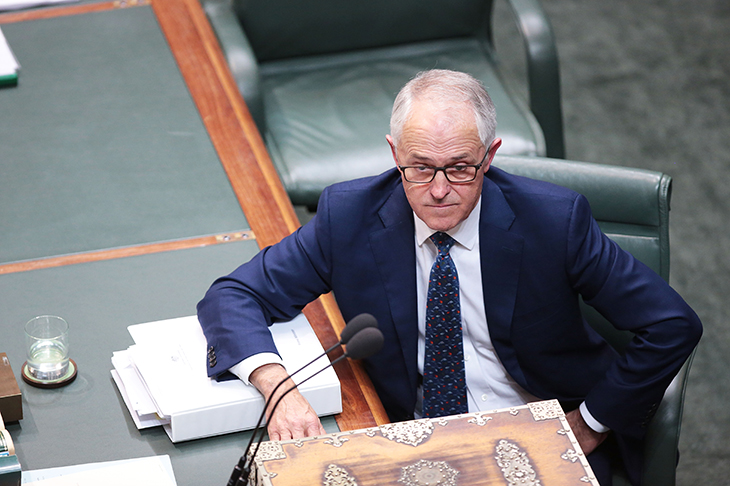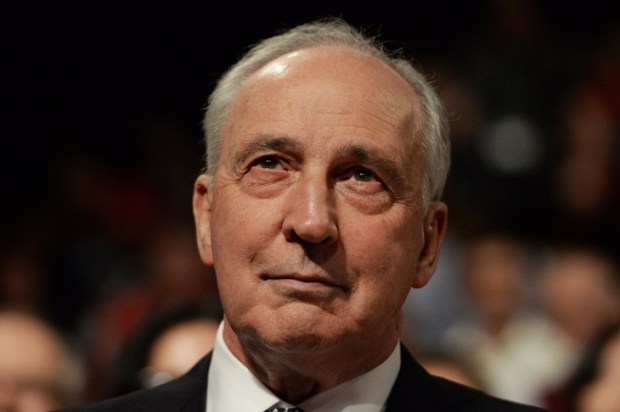It’s been all the fun of the fair as a 10-day long weekend gave voters a chance to observe the candidates in their natural habitats. Prime Minister Morrison shocked the infidels by dragging religion into Easter with a display of genuine Christian fervour in church. More acceptably, Mr Shorten posed with a fake Easter rabbit with whom he shared a passing resemblance. Mr di Natale cavorted in a cavalcade of coal-fired cars, made with metallurgical coal, forged in coal-fired furnaces, to protest the opening of a coal mine. And Mr Palmer’s pantomime politics floated serenely above the political showground like a giant Skywhale handing out shadow ministries to shadowy candidates while United Australia Party advertisements run around the clock, at a cost of $30 million and rising, asking whether democracy can be bought. The answer, if the polls can be trusted, is ‘yes’.
But despite the gaiety elsewhere, a cloud hung over the shores of Point Piper. The Phantom of the election, The Ghost Who Tweets, delivered another disgruntled epistle to his dwindling apostles, on Easter Saturday. Faith in his own resurrection relies on a Labor victory and so he offered a votive to his saviour, Mr Shorten, in the form of an Easter NEG.
It was, he twittered tetchily, quite wrong, to refer to ‘Malcolm Turnbull’s NEG’ when the National Energy Guaran- tee was supported by the entire Cabinet, including the current Prime Minister and Treasurer, the energy sector, the business community, Old Uncle Tom Cobbley and all.
It would have been quite a mouthful to name-check such a throng and it is doubtful how much they supported the proposal; as the head of the Australian Conservation Foundation said at the time, ‘The NEG is nobody’s preferred policy.’
But Mr Turnbull missed the crucial point, which is that the party to which he putatively belongs has abandoned his beloved guarantee and for a very good reason. Call it the Curate’s NEG — it was only good in parts.
Its virtue was that it would guarantee reliability by requiring suppliers to provide energy that was available 24 hours a day. This forced the unreliable suppliers of intermittent energy to team up with reliable ones and stopped investors from pouring money into armies of windmills and acres of solar panels to make hay, and moolah, while the sun shines, without any regard for who would pay for the vital backup system, provided by the much-maligned generators powered by fossil fuels and hydro-electricity.
Its vice was that it included an emissions reduction target for the energy sector that was unnecessary to achieve the overall target of 26-28 per cent for the entire economy. So, the government decided to implement the reliability guarantee through the National Energy Market, together with the investment guarantee to support dispatchable power, and stick with its economy-wide target that offers maximum flexibility to reduce emission as cheaply as possible.
Casting himself as a latter-day Jeremiah, Mr Turnbull tweeted that aban- doning his NEG means that ‘uncertainty continues to discourage investment with the consequence, as I have often warned, of both higher emissions and higher elec- tricity prices’.
What Mr Turnbull fails to acknowl- edge is that the uncertainty derives from the fact the target, even if it were legis- lated, would be increased by a Labor government and that the cost of reduc- ing emissions rises steeply as the target is raised, particularly over a short time- frame.
Mr Turnbull’s NEG included model- ling that purported to show that this was not the case, but if that were true, why not move immediately to a 100 per cent emis- sions reduction target? Only the Greens are crazy enough, or innumerate enough, to advocate that.
Labor has promised that if elected it will increase the NEG’s emissions reduc- tion target to 45 per cent but Mr Shorten has been short with journalists who have had the temerity to ask about the cost of his policy to the economy and to ordinary people.
‘They all say, “Look at the cost”,’ he said somewhat menacingly to a reporter who persisted in trying to nail him down, ‘but never mention the cost of extreme weather events?’, as if by doubling the nation’s emissions reduction target, he would put an end to flood, fire, drought, and cyclones.
Then he started desperately throw- ing around dodgy digits, as if he wanted the reporter to tot them up and produce the pesky figure. ‘I’ll give you the num- bers, 50,000 more jobs in renewables if we go down our path. I’ll give you another number — $18 billion, the cost of natural disasters.’ It was painful to observe.
His fall-back strategy has been to tar those who dare raise the issue of the cost of his policies as allies of the ‘coal- wielding, climate-denying, cave-dwelling Prime Minister’, adding that if the Coali- tion believed in climate change, it would not have got rid of Mr Turnbull. It seems not to have occurred to Mr Shorten that Scott Morrison can hardly be damned as a denier simply for adhering to a target blessed by Saint Malcolm the climate martyr.
In reality, the Paris target set by Mr Turnbull does indeed come at considerable cost but the lion’s share of that price has now been paid in cross-subsidies to renewables and increased electricity charges as well as emissions reduced in the Howard era. Even if the government withdrew from Paris tomorrow, not much of that could be clawed back.
The impact of Mr Shorten’s policy will be much greater, with the large-scale closure of coal-fired power generators, more renewables, more blackouts and expensive back-ups, the introduction nationwide of Queensland-style land clearance policies locking up land with no compensation for farmers and his absurdly ambitious target for the uptake of electric vehicles, pushing up the cost of private transport.
The billowing smoke followed by an almost biblical explosion into flames of a Tesla Model S in Shanghai this week seems emblematic of Labor’s EV policy, and the company’s plummeting deliveries and falling profits are an aide memoire that governments rarely pick winners — losers pick governments.
Even before Mr di Natale started reminding voters that it was he who would call the shots in a future Labor Greens government, it was clear that the main beneficiaries of Labor’s reckless climate policies will be wealthy green investors, well-versed in the arcane alchemy of turning a profit from the prophets of doom. Caveat suffragator, let the voter beware.
Got something to add? Join the discussion and comment below.
Get 10 issues for just $10
Subscribe to The Spectator Australia today for the next 10 magazine issues, plus full online access, for just $10.
You might disagree with half of it, but you’ll enjoy reading all of it. Try your first month for free, then just $2 a week for the remainder of your first year.














Comments
Don't miss out
Join the conversation with other Spectator Australia readers. Subscribe to leave a comment.
SUBSCRIBEAlready a subscriber? Log in